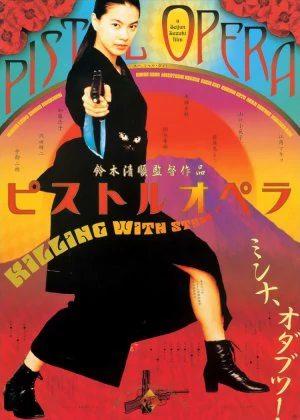Pistol Opera

If you're into weird and you haven't seen Pistol Opera [Pisutoru Opera] yet, just skip this review and make sure you go into the film as blank as possible. Pistol Opera is without a doubt one of the strangest cinematic experiences of the past decade, a film that defies traditional film making rules and beats you to death with its odd exterior. And the greatest things of all: it is directed by one of the sweetest looking Japanese grandpas you can imagine.

Seijun Suzuki is unmistakably the maddest ojisan in cinema. Forget Miike, forget Tsukamoto, forget Lynch and Jodorowsky, none of them are able to out-freak this little Japanese madman. Suzuki is a director that loves to challenge conventions and tries to do so in as many ways as possible. Forget logic, hell, you can even forget about inner-film logic. Pistol Opera is a film that plays by scene and leaves you stranded whenever it feels like it. For some people this will prove to be an enormous challenge, for others it will be the main selling point of the film.
Pistol Opera is set in the same universe as Suzuki's 1967 film Branded To Kill. It's not really a straight-up sequel or remake but borrows a few concepts and retells the film from the bottom up. Stray Cat is third on the ranking list of The Guild, an organization of professional hit man. These killers can rise up through the ranks by accepting targets and killing them efficiently, but lately trouble is brewing among the killers themselves. Even though the list is unknown to its members, one by one they are disappearing from the list, leaving favorable spots that others are more than happy to fill in.
To bring back peace to the organization Stray Cat gets the order to kill the number 1 on the list, One Hundred Eyes. Nobody knows who he is though and so Stray Cat starts her own private investigation. While all of this sounds quite sane and deceptively easy to follow, the reality is actually quite different. The overarching story may be simple enough to keep track of, the weirdness comes from within the individual scenes and spreads through the film like a virus.

The titular opera is reflected in the visualization of Pistol Opera. Many of the film's settings are reminiscent of theater sets (some quite literally), brightened up by strong and vibrant colors. Suzuki sends his camera around these sets in rather complex arcs, often opposing the camera movement with previous scenes to create a disconcerting effect. Suzuki went to considerable lengths to make his film look awesome, sadly the visuals are burdened by a horrible looking 4:3 format. It's a complete mystery to me why Suzuki didn't just give his shots some room to breath, and even though he uses the 4:3 to good effect in a couple of scenes the overall effect feels like missed potential.
The soundtrack is enjoyably quirky and original. Suzuki just likes to play around with whatever means he has to upset his audience. The individual tracks are fun and funky, but it's the weird, often unfitting sound effects that leave a lasting impression. Image a loud, deafening siren starting to howl, followed by a shot of an old phone. First you'll be startled (it's a genuine scare), only to be fooled by something so silly. Small things like that appear all over, making for a very cool and challenging soundtrack.
The acting is solid too but extremely theatrical. Broad gestures and strong, stylized poses pop up everywhere, highlighting the strong opera influences. Makiko Esumi is superb as Stray Cat, putting up a commendable performance and claiming each scene she's in. Esumi finds a great adversary in Sayoko Yamaguchi though, who provides the proper counter-weight for Esumi's character. Then there is a cool cameo of Masatoshi Nagase, other notable appearances include Kirin Kiki and Yoshiyuki Morishita. The acting style won't be to everyone's liking (just like the rest of the film), but it definitely gives the film an extra edge.

If you would neglect the extreme styling and take the film at face value, I'm sure you'd end up with a list of film mistakes longer than the actual script. Characters move their poses and positions in between shots, they walk past each other without seeing one another, they disappear and reappear in unrelated sets. The action sequences are so stylized they don't even count as action sequences any more. There's weirdness all over the place and right when you think Suzuki's box of tricks has dried up he comes up with a new thing to put you in your place.
Pistol Opera is not the easiest of films. You have to accept that the story is a mere hook for some cinematic fun while Suzuki takes a little run with his audience. It's a unique and special experience though, one you won't find anywhere else. The mix of theatrical coolness and playfulness is truly refreshing. Afterwards, when you snap out of Pistol Opera's daze, make sure to Google a picture of Seijun Suzuki for maximum effect. I'm certain that if they ever needed a stock image of a sweet-looking grandpa feeding the ducks with his grand children, there wouldn't be a better choice that Suzuki.